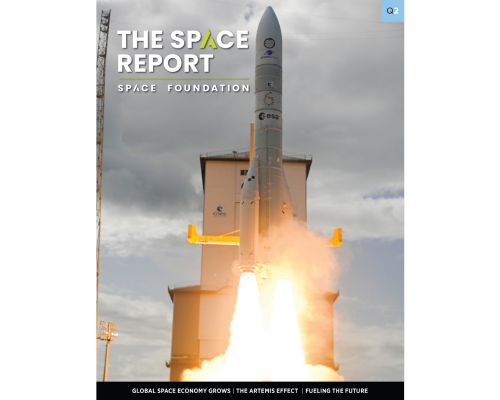Written by: Space Foundation Editorial Team

- The 126 launch attempts through June 2024 exceeded the 2023 record by 30%
- NASA cuts jobs and science funding to support Artemis amid unchanged budget through 2025
- As launches increase, scientists explore greener rocket fuels
COLORADO SPRINGS, Colo. — July 30, 2024 — Space Foundation, aNon-profit organization founded in 1983, which offers education, collaboration and information for the global space ecosystem, launched today The space report Second quarter of 2024, featuring a record pace of rocket launches, NASA’s battle to keep lunar programs on track, new efforts to limit the environmental impacts of launch vehicle fuels, and exploring how new weather satellites will deliver better data for forecasts.
The second quarter edition also includes an analysis of the global space economy across commercial, civil and defense sectors. The total for 2023, published July 18, is $570 billion.
With a launch every 34 hours, 2024 was the busiest first half of any year in the space age. While the bulk of launches carried communications satellites for growing constellations in low Earth orbit, the first half of the year also brought maiden flights of key launch vehicles, including United Launch Alliance’s Vulcan and Mitsubishi’s H3. Those launch vehicles are expected to be workhorses for national security and civil government missions for the United States and Japan. France’s Ariane 6 missed the first half of the year with its maiden flight but launched successfully in early July.
As the pace of launches accelerates, space agencies are increasingly concerned about the environmental impact of launch vehicles, especially emissions in the upper regions of the atmosphere. Those concerns are driving an industry that is developing a variety of environmentally friendly fuels ranging from new biofuels to cleaner production methods for existing propellants. One problem facing the industry, however, is refining new fuels at a competitive price. While agencies study the impact of rockets, researchers say the launch industry accounts for only a fraction of global carbon emissions.
The commercial space industry received a boost in an announcement made at the 39th Space Symposium, when the U.S. Space Force released far-reaching plans to leverage commercial space innovations and capabilities for use on the battlefield. Part of the shift would subsidize a commercial reserve fleet of satellites that could be used in wartime to augment military capabilities. The increase in commercial partnerships also requires the Pentagon to reconsider the classification levels applied to satellite programs to allow for interoperability with the burgeoning space industry and allied-owned spacecraft.
A key U.S. civilian space program, NOAA’s weather constellation, unveiled its fourth and final satellite, GOES-19, which will assist with advanced forecasting. GOES-19 is also equipped with NOAA’s first compact coronagraph to monitor solar activity.
Faced with a tight $25.4 billion budget dictated by the Fiscal Responsibility Act of 2023, NASA faced tough decisions in early 2024, cutting 1,000 jobs and canceling programs to prioritize funding for the Artemis lunar landing program in 2026. The space report details NASA's progress with the program elements necessary for a return to the Moon.
More space companies are preparing for humanity's return to the Moon as they continue to work on components of the Artemis program. The competition between three U.S. companies to design lunar rovers for NASA highlights a broader effort to develop a sustainable presence and economy on the Moon.
About The Space Report
As an information leader, Space Foundation produces one of the most authoritative sources on the global space ecosystem — The space report — provides up-to-date information and perspectives on the global space economy and its activities. First published in 2006, The Space Report is an unrivaled resource for policy analysts, congressional staff, investors, researchers, and space industry practitioners and novices.
With timely research, analysis, interactive data and white papers, The Space Report provides greater insight and knowledge into space exploration, global space spending, defense programs, commercial space trends, workforce development, payload launch and deployment, space innovation and other key industry indicators.
The Space Report is available as an online subscription to access regularly updated and expanded resources and datasets, and also as a quarterly digital publication. For more information about the Space Report, visit www.thespacereport.org.
About the Space Foundation
Space Foundation Space Foundation is a nonprofit organization founded in 1983 that provides education, collaboration, and information for the global space ecosystem. Driven by partnerships, Space Foundation brings together the full spectrum of stakeholders—business, government, education, and local communities—through the support of corporate members, sponsors, fundraising, and grants. Visit Space Foundation at www.FundaciónEspacial.organd follow us on Facebook, X, Instagram, LinkedIn and Youtube.
###
All brands and product names are trademarks or registered trademarks of their respective companies.
Tags: Space Foundation, The Space Report, global space economy, space launch, space technology, space innovation, space ecosystem, space defender, space commerce, space exploration, satellites, space spending, commercial space, space defense
Press contacts:
Rico Cooper
Vice President of Strategic Communications and Outreach
Space Foundation
(202) 596-0714
(email protected)
Dottie O'Rourke
TECHMarket Communications
(650) 344-1260
(email protected)
Related Posts